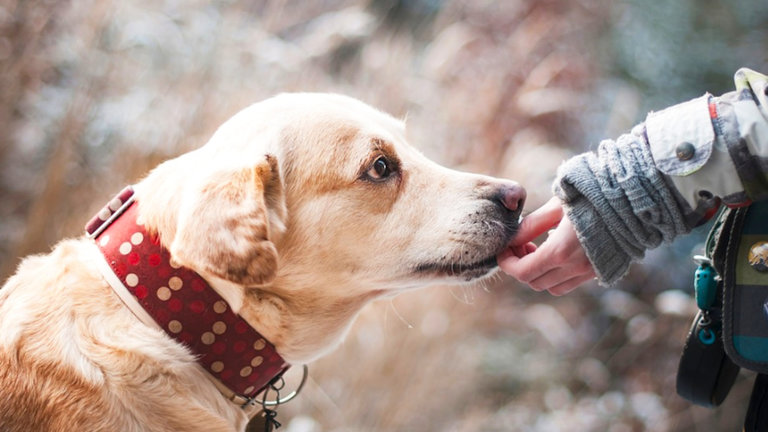The Labrador
Intelligent, co-operative, devoted, friendly.
The Labrador’s temperament is legendary which is a big reason for its popularity. For the passed thirty years, the Labrador retriever has consistently been the most popular breed in the United Kingdom and the United States. Although recently, the French bull dog has challenged that position in the United Kingdom.
Their eyes shine with a kindliness that softens even the hardest of hearts, and they show their enthusiasm with a whole body wag.
Labrador retrievers traditionally come in three colors - chocolate, black or yellow – and were bred to retrieve shot birds and deliver them to the hunter. They’re a medium to large dog (55 - 80 lbs or 25 – 36 kg) and live for 10 -12 years. You can maximize his lifespan with a healthy diet.
Famous Labradors
As the most popular breed as well as the most popular service dog in many countries, there have been a great deal of notable, highly decorated, and famous Labradors, particularly Labrador rescue dogs.
Dorado was a guide dog who led his owner from the Twin Towers during the September 11 attack.
Jake was a Labrador rescue dog that burrowed through white hot debris in search of September 11 survivors.
Lucky and Flo, twin black Labradors, sniffed out so many counterfeit DVDs that software pirates had a £30,000 contract out on their lives.
Marley, from Marley and Me, had people dabbing their eyes with tissues when he (spoiler alert!) grew old and died.
Endal is the most decorated service dog in the world and had a level of intelligence that could only be described as genius. He understood over one hundred voice commands and just as many signed commands. He could operate buttons and switches, load and empty a washing machine, put a card into a cash machine, retrieve the card when the process was complete and return it to a wallet.
When his owner, Allen, was knocked out of his wheelchair by a passing car outside a hotel, Endal pulled Allen into the recovery position, retrieved his mobile phone from beneath a car, took the blanket from the upturned wheelchair and covered Allen with it, barked for assistance and, when none came, ran to the hotel for help. A movie about his life is currently being made.

Positive Traits of the Labrador
- Labradors are happy and bouncy with an enthusiastic attitude towards life. There’s nothing quite like a Labrador’s ‘body wag’.
- Their intelligence and eagerness to please makes them responsive to training.
- Labradors generally get on well with other dogs and pets, even the family cat.
- They are kind and friendly to humans and often love children, which makes them a great family pet.
- The breed is generally a robust and well-balanced dog.
- Labradors have a short easy-care coat
- They thrive on exercise and athletic activities
- They are steady-tempered.

Negative Traits of the Labrador
- Labradors love their food and will overeat if you let them. For this reason, it is a good idea to stick to portions and to curb treat giving.
- Labradors were bred for an active life and need a lot of activity. Due to their love of retrieving, this exercise does not always have to be a walk. They might enjoy a game of fetch in the backyard just as much.
- Their size and enthusiasm can make them somewhat of a bull in a china shop. Keep those body wags and joyful leaps away from small toddlers, the elderly and frail, and fragile ornaments.
- Their friendly nature and love of children may result in merciless face licking.
- They shed a lot and can be smelly.
- Like all floppy-eared dogs, he is more prone to ear troubles than prick-eared breeds.
- Like most puppies, they can sometimes nip when they are young.
Exercise for the Labrador
Labradors are big, exuberant dogs with a lot of energy to burn. If they don’t get enough exercise, this pent-up energy will be directed toward destructive behavior.
But exercise need not be a chore. Labradors love all kinds of activities so choose something that’s fun for both of you. Take him swimming, play fetch or Frisbee, go hiking, or get involved in canine sports such as obedience, tracking and agility.

Training the Labrador
A Labrador’s intelligence and eagerness to please makes him a good learner. As adults, Labradors can pull hard on a leash if untrained. Start training when he is still a puppy, teaching him basic commands such as heel, sit and stay. Puppy preschool followed by obedience classes will get your Lab off to a great start as well as helping to socialize him from an early age. Labradors love training and it will be a bonding experience for you both.
Treats are a useful training aid, but ensure you choose healthy low-calorie treats to avoid him becoming overweight.

Labrador Health Issues
Labradors do not suffer from major health issues brought about by exaggerations bred into their bodies – such as the breathing problems associated with the Bulldog or spinal problems associated the Dachshund – but they do have inherited diseases to which they are prone. The most well known of these is hip and elbow dysplasia.
Fortunately, breeders can have x-rays carried out on potential breeding dogs to check the quality of their joints. They are scored on a scale, and it gives puppy owners an idea of how likely it will be that your puppy will suffer from this disease. The closer to zero a dog’s hip score is the better.
Labradors also suffer from eye problems. Progressive Retinal Atrophy (PRA) is the most common. Your pup’s parents should have clear eye tests and a certificate showing they are clear from all of these.
Labradors are prone to obesity. Recent research has discovered a genetic cause behind the excessive hunger displayed by many Labs. It is important for owners to recognize their Lab’s propensity for weight gain and to modify food intake accordingly. Learn how to limit treats and say no to those pleading eyes.

History of the Labrador
Labradors were first bred one hundred years ago in England by a few hunting aristocratic families. The Labrador’s role as a hunting dog is not to kill, but to retrieve shot game and bring it to its handler.
Today, their role has diversified. Labrador retrievers make excellent guide dogs, military dogs, therapy dogs, sniffer dogs, and search and rescue dogs. #Labrador
Keep your Labrador active with our free WAGSTA walkies, weight and wellness tracker! Join the pack and create the optimal healthy lifestyle for your dog!
Create the optimal healthy lifestyle for your dog with WAGSTA walkies, weight and wellness. Learn more now.
